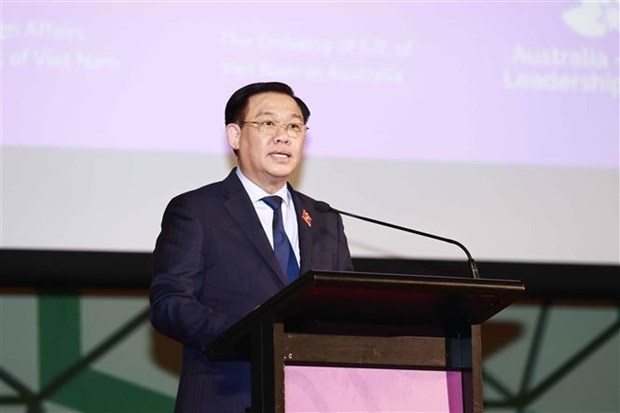NA Chairman addresses Australia - Vietnam Policy Institute
National Assembly Chairman Vuong Dinh Hue has expressed his delight to visit and address the Australia - Viet Nam Policy Institute (AVPI), the first agency in charge of conducting policy research and providing recommendations specifically on the Vietnam - Australia ties.

In his keynote speech at the AVPI in the headquarters of RMIT University in Melbourne city, Victoria state, on December 2 (local time), Chairman Hue said the establishment and operation of the AVPI thus far reflect Australia’s increasing attention to Vietnam, at a time when the two countries are entering a new phase of more robust and substantive development in terms of bilateral relations.
The AVPI has convened many diverse discussions on policy issues, and connectivity among businesses and localities from both sides, he said, hoping that the AVPI will soon become a leading research centre on Vietnam in the region, and serve as an incubator for ideas on the means to further strengthen the Vietnam - Australia ties in the next five decades.
Introducing his speech themed “Enhancing Australia-Vietnam strategic partnership for peace, stability, cooperation and development”, Hue shared his thought on three items, namely the situation in the region and the world, Vietnam’s foreign policy, particularly pertaining to the Indo-Pacific; and the Australia - Vietnam ties at present, and future prospects.
He affirmed that the COVID-19 pandemic, and the increasing interdependence among countries, are testaments to the fact that no country, even major powers, can overcome all challenges by itself, and no country, however small, would lack opportunities for development.
In many cases, hardships constitute the driver for innovation and development. Over the past years, despite external challenges, Australia has made every effort in establishing resilient supply chains, diversifying its market, and bolstering the resilience of its economy.
Such is an invaluable experience for countries, including Vietnam, to learn from, he stated.
“Peace and cooperation for common development continue to be the primary trend of our time. Such is the common aspiration of all countries and peoples worldwide. Countries share the understanding that multilateralism, cooperation, connectivity, and integration in line with international law, rather than selfish nationalism or power politics, constitute the optimal means to overcome challenges.
In this context, Vietnam maintains its wish and strong resolve to work with other countries, including Australia, to pen new and brighter chapters in the chronicle of the region, thereby making substantive contributions to common peace and prosperity around the world”, he said.
About Vietnam’s foreign policy, Hue said Vietnam has now established diplomatic ties with 189 out of 193 UN members, as well as economic and trade relations with over 220 partner countries and economies. The Vietnamese legislature also has relations with more than 140 parliaments worldwide.
He asserted that Vietnam places the people at the heart of every guideline and policy. They are both the goal and driver for development, and for efforts toward social progress and equality. Vietnam is striving to harmoniously address the relationship between interests of different social strata, and continuously improve the living standard and happiness of the people.
The Party, NA, Government and people of Vietnam are making every effort to take Vietnam into a new phase of development, with a wide range of ambitious goals outlined at the 13th National Party Congress. These include:
By 2030, Vietnam will become a developing country with a modern industry and upper-middle income.
And by 2045, Vietnam will become a developed, high-income country.
To fulfill this noble aspiration, Vietnam, first and foremost, is building upon the internal strength of the entire nation, and remaining steadfast in implementing the foreign policy of independence, self-reliance, peace, friendship, cooperation and development, he said.
“With the foreign policy determined at the 13th National Party Congress, we continue to pursue multilateralisation and diversification of external relations, and proactive and actively engage in extensive and intensive international integration. Vietnam is a friend, a reliable partner, and an active, responsible member of the international community.
We respect the fundamental principles of the UN Charter and international law, including the respect for independence, sovereignty, territorial integrity, equality, cooperation, and mutual interest. We also uphold the principle of addressing disputes via peaceful means”, he stated.
Regarding the Vietnam - Australia relationship and its prospects, Hue said over the past half century, despite the various ups and downs in history, cooperation for mutual development has always been the primary trend in bilateral ties.
The cooperation between the Vietnamese NA and the Australian Parliament witnessed robust growth, playing an important role in the development of bilateral ties. With the signing of multiple cooperation agreements, the two sides have maintained regular exchanges of parliamentary delegations, and experience sharing in parliamentary work, particularly in the building of institutions and legal systems.
“The Vietnam - Australia relationship is, at present, stronger than ever. After 50 years, generations of leaders and peoples from both countries have travelled a long way to reach the ties our two countries enjoy today. Few people can imagine that our two countries would be able to reap such success”.
As 2023 marks the 50th anniversary of diplomatic relations, he underscored that it is necessary to bolster economic and trade ties, and consider this the core and driver of the two countries’ Strategic Partnership.
The two countries should further deepen strategic, defense, and security cooperation and need to successfully establish strategic cooperation pillars in education, training, and innovation, and support each other in the successful implementation of digital transformation and green transition towards sustainable development, he said.
Also at the institute, he answered questions on measures to promote the two countries' ties in some areas.
